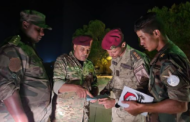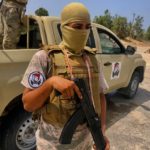Jan. 4 and 6, LPDF Advisory Committee holds first two meetings.
Jan. 5-7, LNA confronts GNA-backed force in Sebha, LNA declares regaining control after three days.
Jan. 5, PFG’s Tobruk-based Hariga Brigade blockades Hariga oil port over unpaid salaries, lifts blockade after local notables give NOC two weeks to pay.
PM Al-Sarraj visits Rome, meets Italian, UNSMIL officials ahead of critical new transition phase.
HARIGA OIL PORT
- Jan. 7, the oil tanker “Olympic Fighter” docked at the Hariga oil port, Tobruk as the Petroleum Facilities Guard ended their strike following the intervention of municipal officials and city elders, who gave NOC two weeks to pay off all salaries so as to avoid a complete shutdown of the port. The “Olympic Fighter” reportedly loaded about a million barrels and sailed off to China;
- Jan. 5, members of the PFG’s Tobruk-based Hariga Brigade blockaded oil exports at the Hariga oil port in protest at a reported year-long delay in salary payments. It is the first blockade since the resumption of oil production and exports last September. Sources from the Hariga Brigade stated that talks with PFG, NOC, and AGOCO had taken place but to no avail.
SEBHA
- Jan. 7, LNA spokesman, Maj. Gen. Ahmed al-Mismari confirmed LNA regained control of the situation in Sebha after “attempts to destabilize security by armed men accompanied by mercenaries”. Earlier on Jan. 4, Sebha had witnessed heavy and medium weapons firefights after a GNA force from the Sabha Military Zone entered the city center and stationed there for hours before withdrawing to its HQ in Al-Qurdah;
- Jan. 5, Maj. Gen. Khaled al–Mahjoub (Director, Moral Guidance Department, LNA) revealed there had been attempts to move mercenaries in southern Libya, explaining that Libyan forces had directed heavy strikes on terrorist organizations in Sebha. He confirmed that Turkey has an interest in the continuing instability in Libya;
- Jan. 4, clashes renewed in Sebha between GNA forces from the South Military Zone and a brigade loyal to Haftar’s forces. A local source said clashes regained momentum after Haftar’s forces attacked the South Military Zone HQ.
SIRTE – JUFRA
- Jan. 7, GNA Sirte-Jufra Ops Room commander Ibrahim Baytelmal reiterated his respect for the 5+5 JMC, but confirmed his doubts on the good faith of the other party, citing ceasefire violations due to the massive number of Russian Wagner Group and Sudanese Janjaweed mercenaries near the frontline.
TRIPOLI
- in the evening of Jan. 8, an explosion and a large fire heavily damaged a fuel station in Al-Bifi, Tajoura district in Tripoli. It remains unclear whether the blast was the cause or the result of the fire. No casualties have been reported, but a number of Bangladeshi workers have been injured in the explosion. Local businesses and transport near the explosion were disrupted, and the authorities considered evacuating nearby buildings and shops as a precaution.

INTERNATIONAL RELATIONS
- Jan. 9, UNSMIL will foresees the deployment of a “limited number of impartial, unarmed, non-uniformed international monitors”, following UNSG Guterres’ proposal to form a Libyan ceasefire monitoring team;
- Jan. 10, during a meeting with his Jordanian counterpart Ayman Safadi in Amman, Italy’s FM Di Maio said ongoing LPDF peace negotiations must be protected from “internal and foreign interference”;
- Jan. 10, Libya’s PM Al-Sarraj met in Rome with UNSMIL acting head Williams to discuss ongoing peace negotiations and more ways to boost the Libyan political dialogue ahead of the next meeting of the LPDF’s Advisory Committee next week in Geneva;

- Jan. 9, Libya’s PM Al-Sarraj met in Rome with US Ambassador to Libya, Richard Norland, to discuss the latest developments in Libya, as well as the political, economic, and military tracks of the UN-led peace process in Libya. They also emphasized the need to stop negative foreign interference in the Libyan affairs;

- Jan. 8, Libya’s PM Fayez al-Sarraj met with his Italian counterpart, Giuseppe Conte and FM Di Maio to discuss the latest developments in Libya and bilateral relations, with specific regard to economic and security collaboration;

- Jan. 8, Algeria’s FM Sabri Boukadoum and US Assistant Secretary of Near Eastern Affairs, David Schenker discussed regional and international issues of common interest, including Libya: Boukadoum stressed that his country “expects neutrality” from the US, especially with regard to the Libyan crisis; Schenker reaffirmed the US agrees with Algeria that the crisis in Libya needs a political solution;

- Jan. 6, UNSMIL announced the GNA and the LNA had exchanged 35 prisoners under the auspices of the 5+5 JMC in the small town of Shwairif, some 417 km S of Tripoli at the end of December. The UK Embassy in Libya praised the exchange;
- UNSMIL head Stephanie Williams and the co-chairs of the Economic Working Group (EWG), including the Ambassadors of Egypt, the EU, and the US, convened a virtual meeting of Libyan policy makers on Jan. 5 to follow up on the basket of reforms discussed in Geneva on Dec. 14-15. The meeting brought together GNA Minister of Finance Bumtari, NOC chairman Sanallah, the GNA Acting Minister of Planning, as well as representatives of the two branches of the Central Bank of Libya (CBL) and the National Audit Bureau;
- Jan. 10, France renewed its support for Libya’s 5+5 JMC to implement the ceasefire. As co-chair of Libya’s Security Working Group (SWG), France stressed that focus must be placed on reopening Libya’s coastal road, expelling foreign forces and disarming militias;
- Jan. 6, the SWG for Libya, represented by the African Union, France, Italy, Turkey, the UK, and UNSMIL held a virtual meeting to discuss the security situation in Libya and more ways to support the work of the 5+5 JMC. The SWG renewed its call to accelerate the implementation of the ceasefire, particularly the opening of the Coastal Road between Abu Grein and Sirte, as well as the immediate repatriation of all foreign fighters and mercenaries;
- Jan. 5, the Gulf Cooperation Council reiterated its support for the United Nations efforts to reach a political solution in Libya, welcoming the ceasefire between the GNA and the Tobruk-based Parliament in Libya, expressing hope that the political dialogue will proceed peacefully between the Libyan parties;
- Jan. 5, EU’s top diplomat in Libya, José Sabadell stated the upcoming weeks will be crucial for the political dialogue and the peace process in Libya, reiterating the EU’s support for the Libyan people’s pursuit of peace and national sovereignty, as well as for the Dec. 24, 2021 elections as a key priority for the political process;
- Jan. 5, the Nigerian President’s spokesperson Jarba Sheikho said the present security deterioration in several African countries has been caused also by the weapons dissemination that occurred in Libya in 2011, arming terrorists and criminals. Sheikho called for African leaders to act together against terrorism, noting that the destabilization of Libya in 2011 had dire effects on Nigeria, Niger, Chad, Cameroon, and other countries;
- Jan. 4, UNSC chairman, UN Tunisian ambassador Tarek El Adab called for a resolution sending international monitors to support Libya’s brittle ceasefire to be adopted as soon as possible. Tunisia assumed the rotating presidency of the UNSC in early January, and at this stage its agenda does not include any meeting on Libya until the end of the month. In response to Tunisia’s call, UNSG Guterres recommended that international monitors be deployed to Libya under a UN umbrella and from a base in the strategic city of Sirte;
- Jan. 6, UNSMIL chief Stephanie Williams facilitated the second virtual meeting of the LPDF Advisory Committee. During the meeting, several proposals about the selection mechanism and the nomination procedures of Libya’s new interim government (labelled the Government of National Unity – GNU) were presented and discussed by the Committee’s members;
- Jan. 4, the LPDF Advisory Committee held its first virtual meeting, discussing the AC’s mandate, tasks, expected outcomes, and the timeframe for its work. In her opening remarks, Stephanie Williams reiterated that the AC will play an advisory role and will work for a period of two weeks to produce concrete recommendations to address differences that have emerged over the selection mechanism and the nomination procedures of the new unified Libyan interim GNU.

























